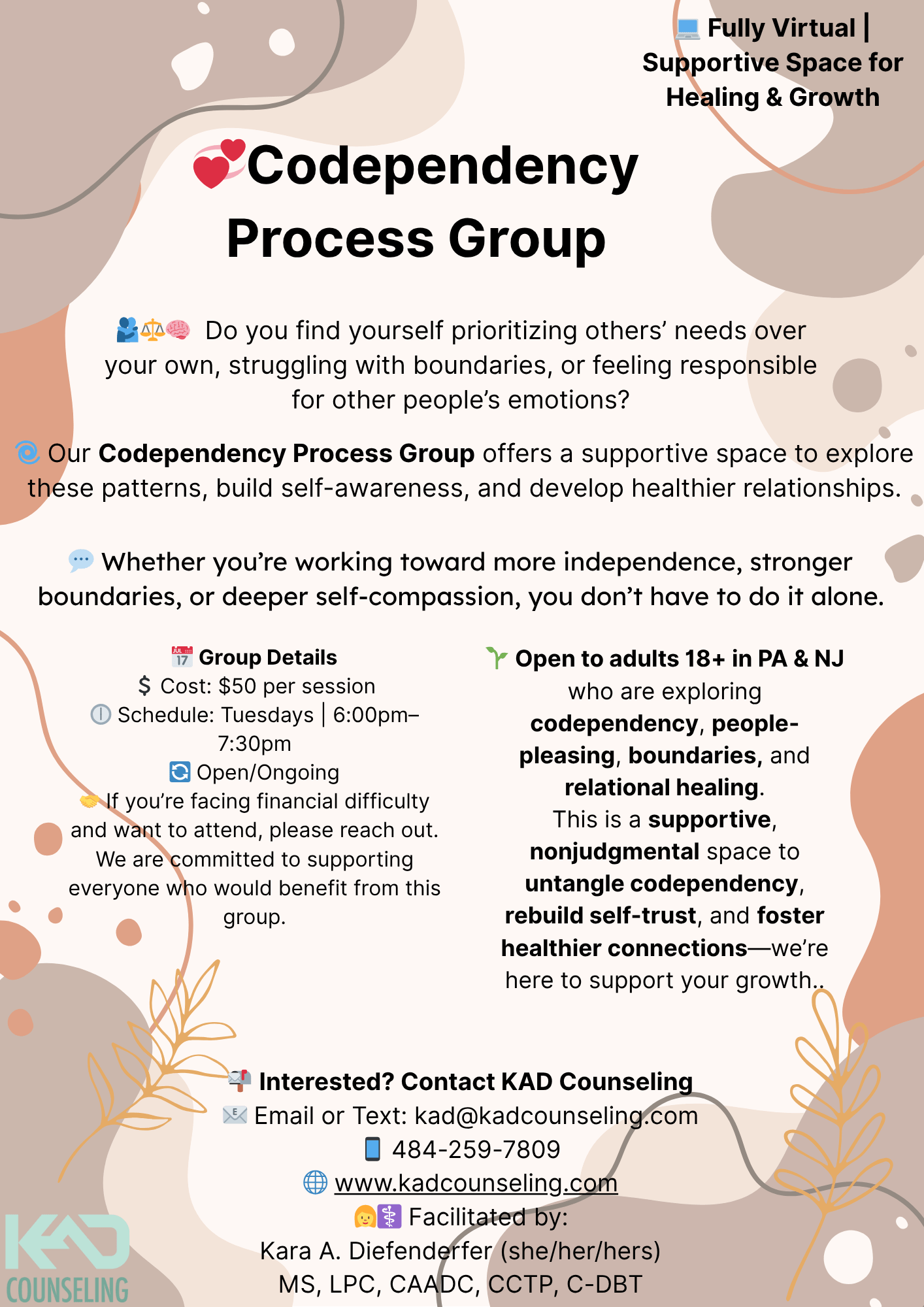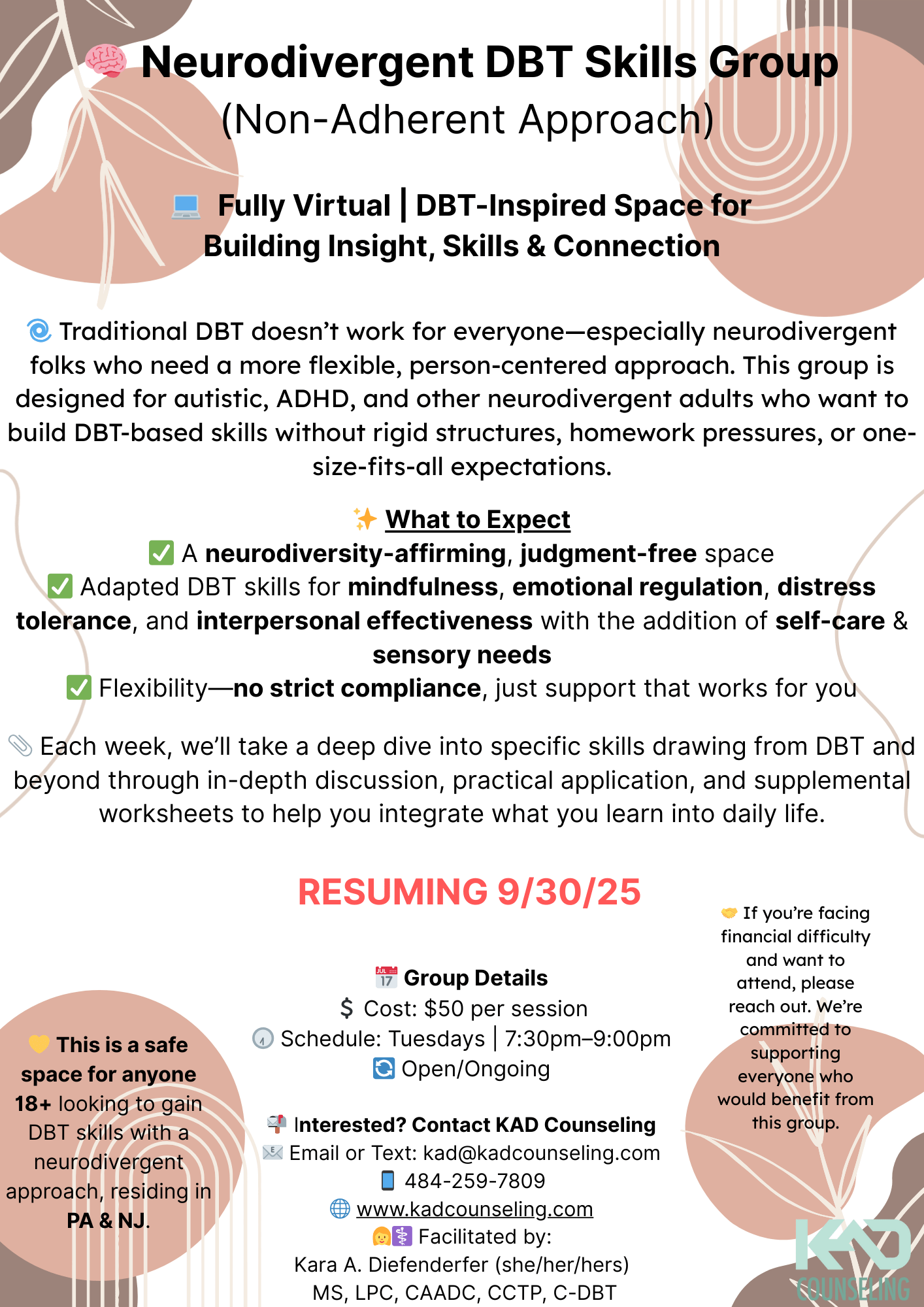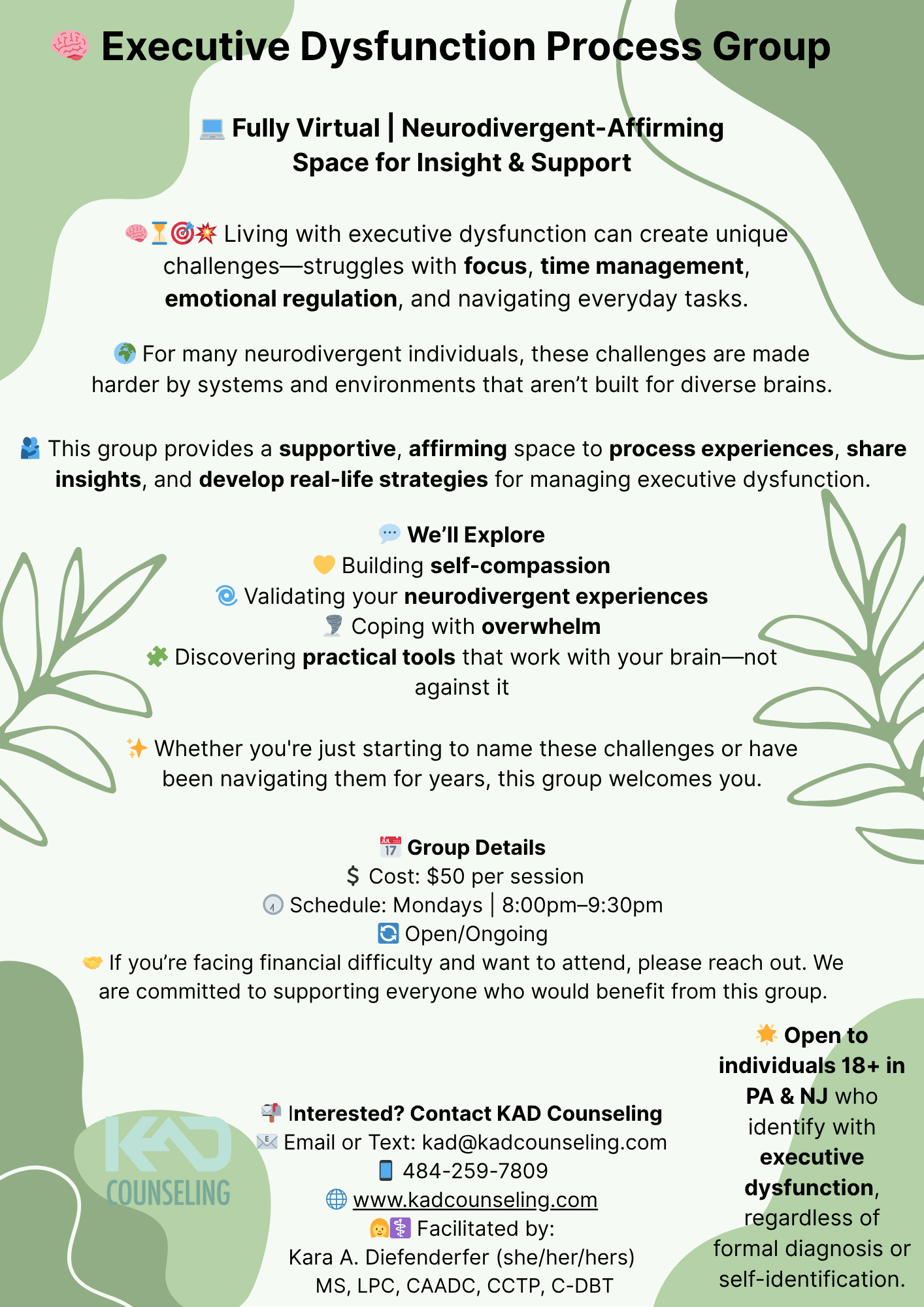We’re here to help.
At K.A.D. Counseling, we offer therapy that centers real humans, real needs, and real growth. Whether you’re seeking one-on-one support, community healing, or learning spaces, our services are designed to honor your autonomy, identity, and nervous system.
🧠 Neurodivergent Affirming Care
We don’t pathologize ADHD, BPD, autism, sensory sensitivity, or emotional intensity. We meet you where you are, with strategies that respect your nervous system, and never ask you to mask or shrink.
🏳️🌈 LGBTQIA+ Affirming Care
You deserve care where your identity is celebrated, not explained. We offer a safe, informed space for queer, trans, nonbinary, and questioning clients to explore, heal, and be seen.
✊ Liberation Affirming Care
Mental health doesn't exist in a vacuum. We honor how power, oppression, and identity impact well-being. This work centers autonomy, community, and collective healing, not just “resilience.”
🧠 Individual Therapy
Personalized, affirming care for adults navigating:
- Neurodivergence
- Trauma
- Identity exploration
- Burnout
- Emotional intensity
We co-create a space that meets you where you are, no masks, no shame, no pressure to perform.
💬 Group Therapy
Connection with folks who just get it.
From DBT Skills and process group to ADHD, BPD, Codependency, and identity-based spaces, our groups offer:
- Support
- Validation
- Skills
- Shared Humanity
Cameras in bed? Snacks and fidgets? Yes please.
📚 Workshops & Psychoeducational Lectures
Accessible, engaging education for communities, providers, and organizations.
Topics include:
- Neurodivergence
- DBT skills
- Trauma-informed care
- Nervous system literacy
All taught through a lens of lived experience and liberation.
🧠 Groups & Psychoeducation at K.A.D. Counseling
Psychoeducation is one of our superpowers. We blend clinical insight, lived experience, humor, and affirming care to make complex mental health topics actually make sense.
All offerings are:
- Fully virtual
- Trauma-informed
- Neurodivergent-affirming
- Designed with care for real humans navigating real life
Professional Care
We support adults (18+) navigating a wide range of experiences, including (but not limited to):
· 🧠 ADHD (Attention Deficit Hyperactivity Disorder)
· 🌀 Autism Spectrum Disorder (ASD)
· 🌧️ Anxiety & Depressive Disorders
· 🔥 BPD (Borderline Personality Disorder)
· 💥 Trauma & PTSD
· 🩺 Chronic Illness & Pain
· 🔁 Chronic Impulsivity or Relapse
· 🍃 Substance Use & Dependency
· 🌪️ Life Transitions & Stressors
· 🔗 Codependency & Coping Skills
· 🪞 Low Self-Esteem
· 🗣️ Social & Communication Differences
· 💞 Ethical Non-Monogamy / Polyamory
· ⚧ Gender Dysphoria & Identity Exploration
· 🌸 Sexual Trauma
· 🎭 Behavioral & Emotional Regulation
What Therapy Offers
There are a variety of approaches in therapeutic counseling. Here are some of them and their benefits:
Adlerian Therapy
- Humanistic and goal oriented, It emphasizes the individual’s striving for success, connection with others, and contributions to society as being indicative of mental health.
- This therapeutic approach focuses on: Engagement, Assessment, Insight & Reorientation.
Attachment-Based
- Grounded in attachment theory which focuses on the inherent biological desire for meaningful relationships. Empirically supported as effective in treatment of suicidal ideation, depression, abandonment, trauma & anxiety.
- This approach is interpersonal, process-oriented, and emotionally focused, incorporating and complimenting other family therapy models.
Motivational Interviewing
- Counseling method helping to resolve feelings of ambivalence and insecurities, finding motivation and behavior changes.
- Practical, empathetic two-fold process that works in both longer & shorter-term therapies..
Person-Centered
- Non-authoritative approach where the therapist acts as a compassionate, non-judgmental facilitator to the client’s process.
- Talk therapy has proven highly effective for self-discovery, self-acceptance, providing a means toward healing & positive growth.
Positive Psychology
- Focusing on strengths & behaviors that allow individuals to build a life of meaning & purpose.
- Focused on identifying and building mental assets.
Psychodynamic
- Focus on recognizing, acknowledging, understanding, expressing, and overcoming negative and contradictory feelings and repressed emotions in order to improve the patient’s interpersonal experiences and relationships
- This in-depth form of talk therapy is often used to treat depression, addiction, social anxiety & eating disorders.
Additional Treatment Models
- DBT (Dialectical Behavioral Therapy)
- Solution Focused
- EMDR (Eye Movement Desensitization Reprocessing)
(this modality is offered on a case-by-case basis for current/former clients)
A Different Approach
At K.A.D. Counseling, we understand that healing is not one-size-fits-all. Our clinicians offer a wide range of therapeutic approaches that go beyond traditional talk therapy. Grounded in neurodivergent-affirming, trauma-informed, and liberation-focused frameworks, we tailor care to meet each client where they are.
What Makes us Different
- Neurodivergent-Affirming Therapy: Our clinicians are trained to support ADHD, autism, and sensory needs with strategies that reject pathology and center empowerment.
- Non-Adherent DBT: We use an adapted version of Dialectical Behavior Therapy, focused on validation, flexibility, and client collaboration, particularly for neurodivergent clients.
- Psychoeducation as Empowerment: We use education as a tool for agency, integrating resources, handouts, and skill-building into every session.
- Cannabis-Positive and Substance-Informed Care: We take a harm-reduction, non-shaming approach to working with substance use, including medical and recreational cannabis.
- Deep Self-Disclosure and Relational Transparency: We believe that authenticity from your therapist can be healing in itself.









